News and Events
Upcoming Events:
INTERDISCIPLINARY COLLABORATION WORKSHOP
WEDNESDAY, SEPTEMBER 11th 12:00-2:00pm
MSU Library, Room 324
Lunch Provided
The Center for Science, Technology, Ethics and Society (C-STES) and the Office of Research Development will co-host a workshop on interdisciplinary collaboration. Faculty from any discipline who are interested in exploring research, scholarly, or artistic collaborations across disciplinary divides are invited to attend.
The workshop will include a panel discussion with experienced collaborators from Earth Sciences, Mechanical & Industrial Engineering, Art and English; interactive group exercises, and practical training. Attendees will leave the workshop with a better understanding of why interdisciplinary collaborations can be beneficial, what shape interdisciplinary collaborations may take, and how to mitigate challenges and maximize success. Those who have successfully collaborated in the past, those currently looking for collaborators, and those who may never have collaborated outside their field before are all encouraged to attend.
Please RSVP here to secure your spot!
2023 Events
"Unruly Matters: Blackness, Aesthetics, and the late 19th-Century's 'New' Data Regimes"
February 15, 2024
Dr. Autumn Womack, an Associate Professor of African American Studies and English at Princeton University discussed the burdened yet vital interplay between turn of the twentieth-century data regimes and Black life itself. She is the author of The Matter of Black Living: The Aesthetic Experiment of Racial Data, 1880-1930 (The University of Chicago Press, 2022), which explores the intimate relationship between black life, aesthetics, and emergent data regimes at the turn of the twentieth century.
2022 Events:
"Inherent Relationships, Earth Law, and the Pursuit of Water Justice"
May 25, 2022
Dr. Kelsey Leonard is a Canada Research Chair in Indigenous Waters, Climate and Sustainability and an Assistant Professor in the Faculty of Environment at the University of Waterloo. Her research focuses on Indigenous water justice and its climatic, territorial, and governance underpinnings. She is an enrolled citizen of Shinnecock Indian Nation.
Life in the Land: Connecting People and Place in Montana
May 24, 2022
A documentary film screening and Q & A with filmmakers Lara Tomov and Lailani Upham
Life in the Land is a documentary film and podcast series that shares stories of those who interact with the complexities of Montana’s lands, waters, and communities, looking at the success and value in collaborative & locally-led initiatives. Hear unique perspectives from community leaders, ranchers, biologists, and more within Montana’s rural and tribal communities on how we can hold healthy relationships with the land as well as one another to promote resilient communities and ecosystems for all life to thrive.
If you missed the event, you can still watch the films and listen to podcasts at Life in the Land's website.
Water in the West: Toward Convergent Solutions to Water Security
Interdisciplinary Regional Workshop
May 24 - 26, 2022
Water is the life blood of the North American West. We depend on it to produce our food, to power and supply our homes, to fuel our industries, and to sustain the wildlife and natural ecosystems that we cherish. Yet this vital resource is facing increasing threats from climate change impacts, population growth, and various contaminants. Northern Rockies and Plains States are already seeing increased early spring flooding and late summer drought and it is vital that we prepare our communities to be resilient against these changes. Realsolutions will require what the National Science Foundation has referred to as convergent research or collaborative transdisciplinary research for social benefit, which is the focus of this workshop.
2022 Hausser Lecture with Professor Kyle Whyte
Indigenous Climate Justice: Transforming Law, Energy, and Science
March 3, 2022
Dr. Whyte is a member of the White House Environmental Justice Advisory Council, the George Willis Pack Professor of Environment and Sustainability at the University of Michigan, and an enrolled member of the Citizen Potawatomi Nation. This lecture is presented by C-STES and MSU's Department of History and Philosophy.
View Our Past Events:
Engineering Courage: Ethics and Professionalism in a Complicated World
Recorded October 14 & 15, 2021
An interdisciplinary two-day event honoring Allan J. McDonald, MSU alumnus and Challenger explosion whistleblower. Panel discussions feature Dr. James Hansen, Auburn University historian; Dr. Rob Maher, MSU Electrical Engineering; Dr. Paul Lachapelle, MSU Political Science; Dr. William Schell, MSU Mechanical & Industrial Engineering; Dr. Laura Black, MSU Business; Dr. Joseph Menicucci, MSU Chemical & Biological Engineering; Dr. Paul Gannon, MSU Chemical & Biological Engineering; Dr. Doug Cairns, MSU Mechanical & Industrial Engineering; Dr. Maryann Cummings, MSU Computer Science; Dr. Sara Rushing, MSU Political Science; Dr. Bonnie Sheehey, MSU Philosophy; Dr. Mark Quinn, MSU Microbiology & Immunology and Chair of MSU's Institutional Review Board for research involving human subjects.
Science Matters Lecture: “Truth, Lies, and O-Rings: Inside the Space Shuttle Challenger Disaster”
Recorded October 14, 2021
An online community event featuring Dr. James R. Hansen, Auburn University historian
Understanding Vaccine Hesitancy and COVID Vaccination in Montana
Recorded Tuesday, April 6, 2021
An online community event featuring Dr. Maya Goldenberg, University of Guelph and Matt Kelley, Gallatin Valley Public Health Officer.
The Search for Life on Mars and Beyond
ONLINE COMMUNITY EVENT FEATURING: Dr. Sarah Johnson, Georgetown University and Dr. Carol Cleland , University of Colorado, Boulder
Recorded Wednesday, February 24, 2021
Exciting new research is attempting to find evidence for either extinct or existing life in the universe. Previous Mars missions found that liquid water existed on Mars in the distant past, raising the question of whether there might be evidence for extinct life.
Click here to learn more about the event...
How Will Climate Change Impact Health in Montana?
Recorded Tuesday, January 26, 2021
An online community event featuring:
- Alexandra Adams, M.D., PhD., Director and Principle Investigator for the Center for American Indian and Rural Health Equity at Montana State University
- Robert Byron, MD, MPH, FACP, Vice Chair of the Montana Health Professionals for a Healthy Climate
- Bruce Maxwell, PhD., Co-Director for the Montana Institute on Ecosystems
We know about some of the ways in which climate change is impacting the U.S. West, through hotter temperatures, droughts, fire hazards, and changing ecosystems. A special report published by the Montana Climate Assessment details how these changes are likely to impact human health. Learn more about this event
Pandemic Politics and Polarization
Recorded: Wednesday, October 28th at 6:00 PM
This online WebEx event featured Cailin O’ Conor from UC Irvine and Eric Raile from MSU, who led a discussion about how political polarization has occurred over the pandemic, both nationally and in the state of Montana. Q & A to followed the presentations. Learn more about the event.
Slowing the Spread: How We Can Detect the Virus in Multiple Ways
Recorded: Wednesday, September 23 at 6 pm (~1 hr)
This online WebEx event featured MSU researchers Dr. Blake Wiedenheft and Dr. Seth Walk as they discussd their efforts to monitor levels of the COVID-19 virus with wastewater testing in Gallatin County and increasing swab testing throughout our state. Q & A followed the presentations. Learn more about the event
** The video begins just as Dr. Wiedenheft starts his talk. His introduction is here.
Spillover: Understanding the Origins of Pandemics
Recorded: Wednesday, August 26 at 6:00 PM (~1 hr)
David Quammen and Dr. Raina Plowright discuss how infectious diseases can be passed from animals to humans leading to pandemics that we have no natural immunity to (such as COVID-19). Read more about the spillover event
"What's Killing the Bees? The Impacts of Pathogens and Other Factors on Honey Bees"
Thursday, March 5th at 4:30pm in Barnard 126Presented by Michelle Flenniken (Plant Pathology & Plant Sciences)
Learn more here
Honey bees are the primary insect pollinators of U.S. crops and whose work
is valued at approximately $17 billion annually. Unfortunately, for the past
10 years, honey bee colony losses have approached 30 percent, annually.
Join Michelle Flenniken, MSU microbiologist and co-director of MSU’s
Pollinator Health Center, for an exciting conversation on what’s affecting
honey bee colony health and the importance of basic and applied science to
address this important global challenge.
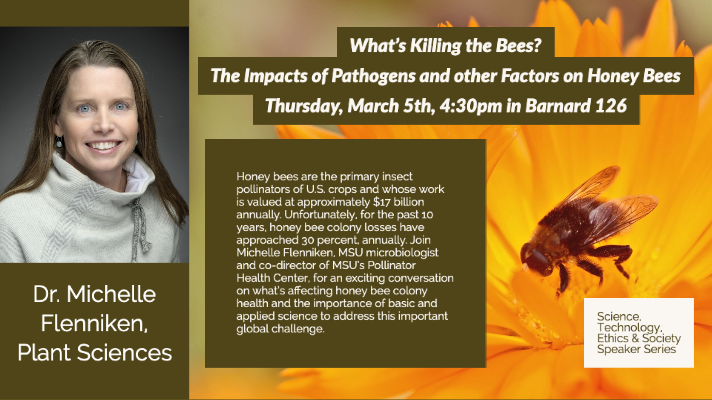
The Science, Technology, Ethics & Society (STES) Speaker Series is a speaker series aimed at facilitating interdisciplinary conversations and collaborations between faculty and students across campus.
"Challenges and Opportunities in Public Infrastructure"
Tuesday, February 25th at 4:30pm in Barnard 108
Presented by Craig Woolard (Civil Engineering)
The Bozeman area is rapidly growing and we are close to hitting a population of 50,000. What does this mean for the public infrastructure systems that we will need, the challenges we will face, and the opportunities that may arise? Come find out as we kick-off the STES Interdisciplinary Speaker Series with a talk by Dr. Craig Woolard (Civil Engineering). Discussion and snacks to follow the talk!
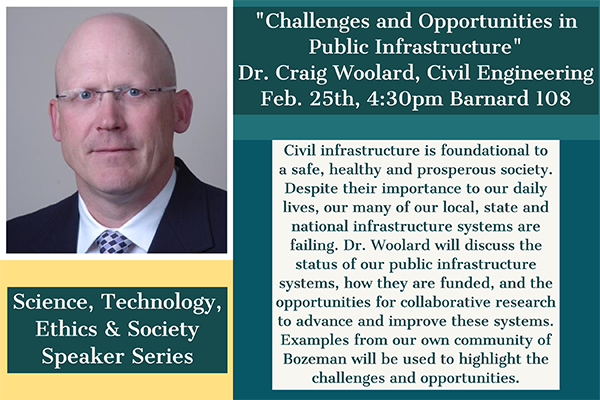
The Science, Technology, Ethics & Society (STES) Speaker Series is a speaker series aimed at facilitating interdisciplinary conversations and collaborations between faculty and students across campus.
Science Matters Lecture Series, Kate Brown
Museum of the Rockies, Hager Auditorium
STES Grant-Writing Bootcamp
October 28th, 2019- January 13th, 2020
Facilitated by Nika Stoop, Center for Faculty Excellence and Co-Sponsored by MEERC
Thinking of submitting a grant related to the ethical/social/policy dimensions of science or technology? Want to identify collaborators from other disciplines? Want to broaden the impacts of a grant you are working on, particularly in mentoring or public engagement? This is for you!
This 6-week long program (over four months) is specifically for faculty, post-docs, or graduate students who are interested in collaborating on interdisciplinary grants to submit to NSF’s Cultivating Cultures for Ethical STEM, which has a due date of February 24, 2020 or to NSF’s Science & Technology Studies Program, which has a due date of February 3rd 2020). Those working on specific proposals to other programs or funding agencies would also be welcome. Each session is approximately 3 hours long and lunch will be provided.
Schedule & Topics
WEEK #1 (October 28th): GENERATING PROPOSAL IDEAS
- Read the program summary for CCE-STEM and STS programs
- Identify opportunities
- Hear from those who have successful grants or served on panels from these programs
- Generate ideas for proposals
- Homework: write a proposal summary for your grant
WEEK #2 (November 4th): DESIGNING PROJECTS – SIGNIFICANCE, METHODOLOGY, ASSESSMENT (CCE)
- Refine project ideas
- Challenges in selecting and explaining interdisciplinary methodologies
- What assessment is required (e.g., in the case of interventions proposed for CCE)
- Identify collaborators/expertise needed
- Homework: draft project significance OR methodology OR expertise OR assessment section.
WEEK #3 (November 18th): HOW TO BROADEN IMPACTS
- Understanding different components of the BI criterion.
- Opportunities for broadening impacts at MSU and with local/state/national communities
- Non-academic avenues for dissemination
- Understanding engagement vs. dissemination
- Increasing participation (particularly among underrepresented groups).
- Homework: Statement of broader impacts
WEEK #4 (November 25th): WRITING YOUR STORY, PUTTING THE PUZZLE TOGETHER
- Refining project descriptions, timelines
- Adding Biosketches
- WHY this project should be carried out at MSU by THIS team with the FACILITIES we have
- Ethics of Mentoring Plans and Data Management
- Homework: Biosketch, Facilities, Mentoring, Data Management
WEEK #5 (December 2nd): BUDGETS
- Budget Basics
- Q & A with OSP
- Reading budgets critically to spot what might raise red flags for reviewers.
- Homework: Draft Budget
WEEK #6 (January 13th): FULL PROPOSAL PEER-REVIEW
- Review criteria/what reviewers are looking for
- Work in groups to evaluate full proposals and provide feedback
- Homework: Revise proposals
An Enemy Of The People By Henrik Ibsen
October 10-13 & 19-20
Bozeman Actors Theater will preform An Enemy of the People (adapted by Arthur Miller) at The Museum of the Rockies, Hager Auditorium (7:30pm Thursday-Saturday & 3:00pm on Sunday). Tickets can be purchased here: https://app.arts-people.com/index.php?ticketing=bat.
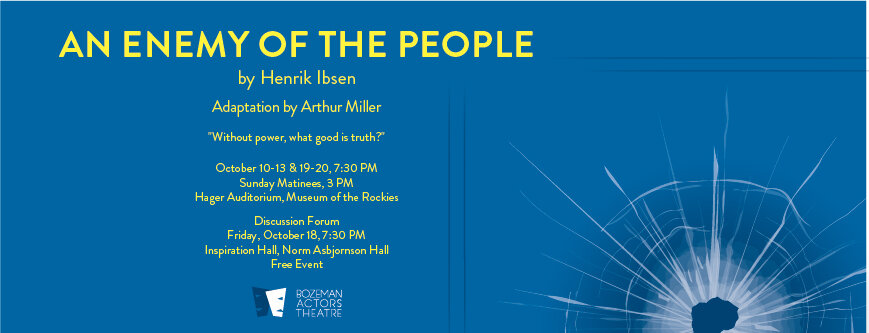 About the play:
About the play:
When Dr. Thomas Stockmann learns that the famous and financially successful baths in his hometown are contaminated, he insists they be shut down for expensive repairs. For his honesty, he is persecuted, ridiculed, and declared an “enemy of the people” by the townspeople, including some who have been his closest allies. Bozeman Actors Theatre returns to the Museum of the Rockies to stage one of the most frequently performed plays by the “father of modern drama.”
Directed by Gordon Carpenter
Friday, October 18 -- FREE Discussion Event of the issues raised in An Enemy of the People, featuring work by MSU students
This event, featuring a panel discussion and research presented by MSU graduate and undergraduate students will be at 7:30pm in Inspiration Hall, Norm Abjornson Hall.
2019 Hausser Lecture - "Will Autonomous Cars Ever Be Safe Enough?"
About the Speaker:
Johnson is the author/editor of seven books including most recently, Engineering Ethics: Contemporary and Enduring Debates to be published by Yale University Press in 2020. In addition to her books, Johnson has published over 100 papers in a wide variety of journals and edited volumes.
In recognition of her contributions, Johnson received the Joseph Weizenbaum ward for life-long contributions to information and computer ethics from the International Society for Ethics and Information Technology in 2015. She received the John Barwise prize from the American Philosophical Association in 2004; the Sterling Olmsted Award from the Liberal Education Division of the American Society for Engineering Education in 2001; and the Making a Difference Award from the ACM Special Interest Group on Computers and Society in 2000.
Science Matters Lecture - "The Science of Optics, The History of Art"
Charles Falco, Emeritus Professor in the College of Optical Sciences and Department of Physics at the University of Arizona, Tucson, presented "The Science of Optics; The History of Art" in the Hager Auditorium at the Museum of the Rockies at 5:30pm on September 10th, 2019, as part of the Science Matters Lecture Series.
Summary
Recently, renowned artist David Hockney observed that certain drawings and paintings from as early as the Renaissance seemed almost "photographic" in detail. Following an extensive visual investigation of western art of the past 1000 years, he made the revolutionary claim that artists even of the prominence of van Eyck and Bellini must have used optical aids. However, many art historians insisted there was no supporting evidence for such a remarkable assertion.
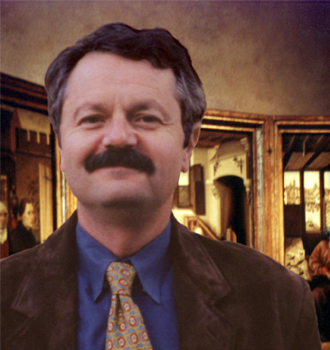 In this talk, Charles Falco will show a wealth of optical evidence for Hockney's claim
that Hockney and Falco subsequently discovered during an unusual, and remarkably productive,
collaboration between an artist and a scientist. Falco will also discuss the imaging
properties of the "mirror lens" (concave mirror), and some of the implications this
work has for the history of science as well as the history of art and the modern fields
of machine vision and computerized image analysis. These discoveries convincingly
demonstrate optical instruments were in use—by artists, not scientists—nearly 200
years earlier than commonly thought possible and account for the remarkable transformation
in the reality of portraits that occurred early in the 15th century.
In this talk, Charles Falco will show a wealth of optical evidence for Hockney's claim
that Hockney and Falco subsequently discovered during an unusual, and remarkably productive,
collaboration between an artist and a scientist. Falco will also discuss the imaging
properties of the "mirror lens" (concave mirror), and some of the implications this
work has for the history of science as well as the history of art and the modern fields
of machine vision and computerized image analysis. These discoveries convincingly
demonstrate optical instruments were in use—by artists, not scientists—nearly 200
years earlier than commonly thought possible and account for the remarkable transformation
in the reality of portraits that occurred early in the 15th century.
About the Speaker
Charles Falco has joint appointments as Emeritus Professor in Optical Sciences and Physics at the University of Arizona where he held the UA Chair of Condensed Matter Physics. He is a Fellow of the American Physical Society, the Institute of Electrical and Electronics Engineers (IEEE), the Optical Society of America and the Society of Photo-optical Instrumentation Engineers (SPIE). He has published more than 275 scientific manuscripts, co-edited two books, has seven U.S. patents and given over 400 invited talks at conferences, research institutions and cultural organizations in 32 countries.
In addition to his scientific research, he was co-curator of the Solomon R. Guggenheim museum's "The Art of the Motorcycle" which, with over 2 million visitors in New York, Chicago, Bilbao and the Guggenheim Las Vegas, was by far the most successful exhibition of industrial design ever assembled. More recently, he and the world-renowned artist David Hockney found artists of such repute as van Eyck, Bellini and Caravaggio used optical projections in creating portions of their work. Three international conferences have been organized around these discoveries and recognition for them includes the Ziegfield Lecture Award from the National Art Education Association, the Dwight Nicholson Medal from the American Physical Society and a presentation in the opening ceremony of the 2015 United Nations 'International Year of Light'.
Timon of Anaconda: Theater for the Anthropocene
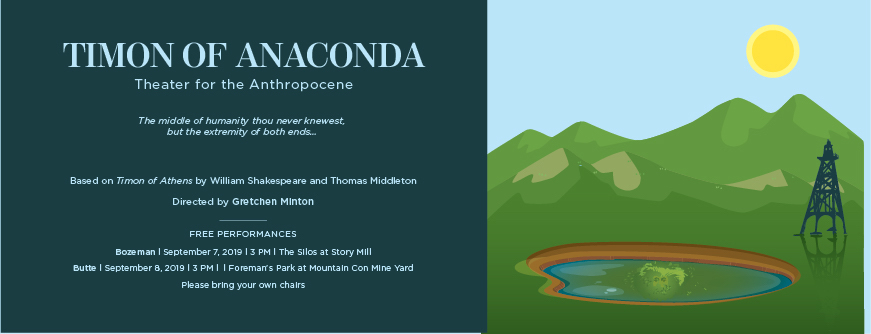
Dr. Gretchen Minton at Montana State University presents an adaptation of Shakespeare’s Timon of Athens in Bozeman and Butte on September 7th and 8th. These free outdoor performances represent Minton’s latest research project, which endeavors to use site-specific classical drama as a way of addressing the challenges of human impact on our ecosystems. The performance venues—The Silos at Story Mill in Bozeman and Mountain Con Mine Yard in Butte—were chosen because these sites are formerly industrial areas that have been reclaimed as spaces for public gatherings and artistic projects.
Timon of Athens has become popular recently due to its topics of greed, friendship, loyalty, economic disaster, and environmental degradation. Minton is setting her 75-minute adaptation of this play, called Timon of Anaconda, in 1960s-70s Butte, Montana. The play tells the story of a mining mogul who loses everything and is abandoned by his friends. He then attempts to retreat to the wilderness, only to find that there is no place that does not have the mark of human activity.
Dr. Minton is a full professor of English at Montana State University, specializing in Shakespeare and his contemporaries. Since 2011, Minton has served as Dramaturg for Shakespeare in the Parks and Bozeman Actors Theatre, as well as giving lectures at international festivals and conferences. ecosystems. The performance venues—The Silos at Story Mill in Bozeman and Mountain Con Mine Yard in Butte—were chosen because these sites are formerly industrial areas that have been reclaimed as spaces for public gatherings and artistic projects.
Minton uses drama, Shakespeare in particular, as a means of exploring the Anthropocene, a time when human impact upon the earth has become the most dominant force on the environment. She notes that Shakespeare was concerned about human impact on the earth as far back as the beginning of the seventeenth century when he wrote Timon. Because the vast majority of Montanans love their public lands and show a high concern for environment protections, this play can help us consider our culpability in ecological disaster, but also imagine a way forward that can include better stewardship of our natural world.
Free public outdoor performances are offered in Bozeman on Saturday 7 September at 3 pm at The Silos at Story Mill, and in Butte on Sunday 8 September at 3 pm at Foreman’s Park at Mountain Con Mine Yard.
"How Smart is TOO Smart? Exploring the Pros and Cons of Artificial Intelligence"
From Siri to robotic surgery, from media and music streaming to Google Maps, artificial intelligence (AI) has a significant impact on our lives. But, what are the implications of AI on human development and personal autonomy? What effect will AI have on jobs in the future? What ethical concerns must we address as AI systems are deployed? Join in on the discussion as our panel explores the benefits and drawbacks of AI and its rapidly evolving technology. This is the third in the SymBozium Series, Presented by the Bozeman Public Library.

